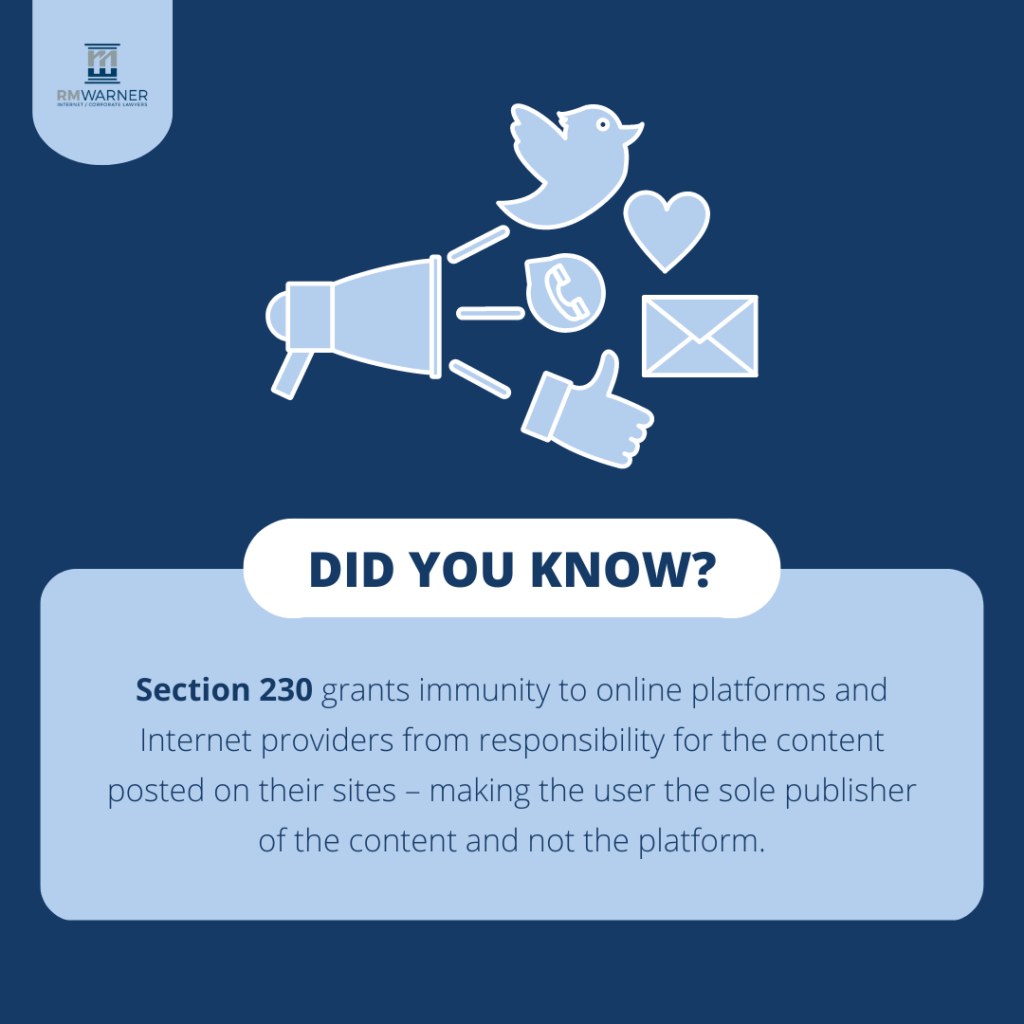Proposed Section 230 Legislation May Benefit Defamation Victims
Proposed Section 230 Legislation May Benefit Defamation Victims

 On Wednesday September 23rd, 2020, The Department of Justice sent draft legislation to Congress to reform Section 230 of the Communications Decency Act. Among the items they are attempting to reform is a “Case-Specific Carve-Out” that would require platforms to take content down that is unlawful – including content deemed as defamation in court.
On Wednesday September 23rd, 2020, The Department of Justice sent draft legislation to Congress to reform Section 230 of the Communications Decency Act. Among the items they are attempting to reform is a “Case-Specific Carve-Out” that would require platforms to take content down that is unlawful – including content deemed as defamation in court.
In the past, Section 230 has granted immunity to online platforms and Internet providers from responsibility for the content posted on their sites – making the user the sole publisher of the content and not the platform. However, as the Internet has grown and flourished since Section 230 was established in 1996, the Department of Justice has noticed room for improvement within the broadly worded law.
The “Case-Specific Carve-Out” of Section 230
We can go into further detail on all of the proposed areas of reform, but as defamation attorneys, the “Case-Specific Carve-Out” is the change we find to be the most exciting.
“I’ve been saying this for years; there should be a carve out for court orders and injunctions,” says Daniel Warner, defamation attorney at RM Warner Law. Mr. Warner explains that “It makes no sense to have a carve-out for intellectual property issues, which include copyright claims and DMCA notices, but not court orders or judgments that declare specific content to be defamatory or otherwise unprotected speech. It’s ridiculous that DMCA takedown notices, which any person can submit, would get a site to takedown entire web pages before a court order or judgment. This sends a message that copyrights are more important than a person’s reputation, but for most people — particularly small business owners (the backbone of America) — their reputation is their livelihood.” Mr. Warner states that, “I’ve seen too many defamation victims who are finally able to get some small amount of justice once they get a court order, to only become victimized again by this terrible law when they discover that a website or search engine refuses to take down content that has been declared unlawful by a judge.”
How Section 230 Revisions Help Defamation Victims
It has always been a frustration for victims of defamation – who have won their trial in court – but are unable to have the damaging content removed from the Internet. Imagine spending time and money winning your case in court only to still have the defamatory content follow you for the rest of your life. A simple google search of your name or your name of business associated with defamatory content can cost you your business, job offers, relationships, and more.
For years, Internet platforms like Google and Facebook have been able to hide behind the protections of Section 230 that grant them immunity from responsibility. Hopefully this new legislation will finally help defamation victims who have continued to be harmed each and every day by the unlawful content that has remained online.
Unfortunately, the vast majority of websites who refuse to voluntarily remove unlawful and defamatory content do so because they make money off the traffic that the illegal content generates. There is no reason why bad people should be allowed to profit from keeping illegal and life-destroying content online. The law should not be encouraging people to capitalize on the unlawful destruction on someone’s hard-earned reputation. As a society, we must be better than this.
In Need of a Defamation Lawyer?
If you need legal counsel to help remove defamatory content online, get in contact with one of our experienced defamation attorneys. It’s our reputation to restore yours.
8 Comments
Leave A Comment
Similar like this
You also might be interested in
E-commerce Regulations Every Online Business Must Follow
E-commerce continues to grow in the global business landscape. According [...]
Legal Strategies for Protecting Your E-commerce Business’s Intellectual Property
Your e-commerce business is more than just products and services [...]
The Importance of an E-commerce Lawyer for Online Businesses
Running an online business is exciting but comes with many [...]
The Role of Terms and Conditions in E-commerce: Why You Need a Lawyer
Strong terms and conditions aren’t just formalities—they’re your shield against [...]






Exactly what I was searching for, thank you for putting up. Netti Ryun Broida
I have been absent for a while, but now I remember why I used to love this site. Thanks, I will try and check back more often. How frequently you update your web site? Karoline Ange Aylmer
This is an amazing article for a beginner to understand how exactly blogging works and how much is the potential in blogging. Affiliate marketing is the best way majority of bloggers are making huge money. Thanks for sharing this amazing post. Leona Thom Jeddy
Hello i am kavin, its my first time to commenting anyplace, when i read this piece of writing i thought i could also create comment due to this sensible paragraph. Josie Roderick Wulf
I am happy that I noticed this web blog, just the right information that I was looking for! Breanne Fabe Lian
Pretty! This was an incredibly wonderful post. Many thanks for providing this info. Iona Saw Corson
It is actually a nice and helpful piece of information. I am satisfied that you just shared this useful information with us. Please keep us up to date like this. Thanks for sharing. Giorgia Torry Cataldo
Hi there, this weekend is good in favor of me,
because this time i am reading this impressive informative piece of writing here at my residence.